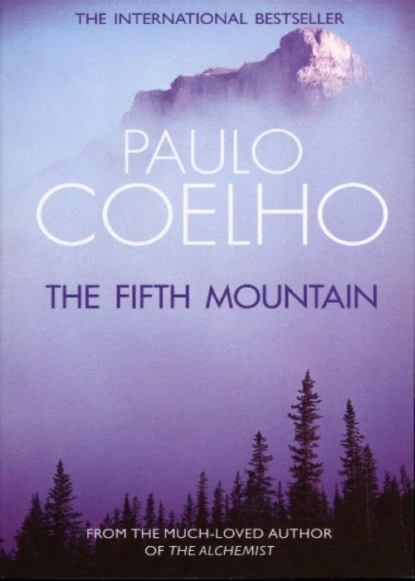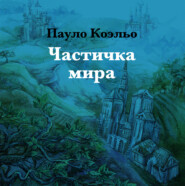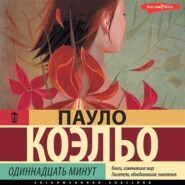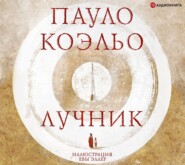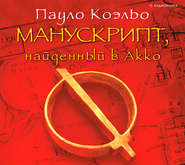По всем вопросам обращайтесь на: info@litportal.ru
(©) 2003-2024.
✖
The Fifth Mountain
Автор
Год написания книги
2019
Настройки чтения
Размер шрифта
Высота строк
Поля
The soldier’s hand released the string, the arrow slashed through the air, hummed past his right ear to bury itself in the dusty ground behind him.
The soldier rearmed his bow and pointed it. But instead of firing, he fixed his eyes on Elijah’s.
“I am the greatest archer in all King Ahab’s armies,” he said. “For seven years I have never erred a shot.”
Elijah turned to the Levite’s body.
“That arrow was meant for you.” The soldier’s bow was still taut, and his hands were trembling. “Elijah was the only prophet who must be killed; the others could choose the faith of Baal,” he said.
“Then finish your task.”
He was surprised at his own calmness. He had imagined death so often during the nights in the stable, and now he saw that he had suffered unnecessarily; in a few seconds all would be ended.
“I can’t,” said the soldier, his hands still trembling, the arrow changing directions at every instant. “Leave, get out of my presence, because I believe God deflected my arrow and will curse me if I kill you.”
It was then, as he discovered that death could elude him, that the fear of death returned. There was still the possibility of seeing the ocean, of finding a wife, having children, and completing his work in the shop.
“Finish this here and now,” he said. “At this moment I am calm. If you tarry, I will suffer over all that I am losing.”
The soldier looked about him to make certain that no one had witnessed the scene. Then he lowered his bow, replaced the arrow in its quiver, and disappeared around the corner.
Elijah felt his legs begin to weaken; the terror had returned in all its intensity. He must flee at once, disappear from Gilead, never again have to meet face-to-face a soldier with a drawn bow and an arrow pointed at his heart. He had not chosen his destiny, nor had he sought out Ahab in order to boast to his neighbors that he could talk with the king. He was not responsible for the massacre of the prophets—nor even for, one afternoon, having seen time stop and the carpentry shop transformed into a dark hole filled with points of light.
Mimicking the soldier’s gesture, he looked to all sides; the street was deserted. He thought of seeing if he could still save the Levite’s life, but the terror quickly returned, and before anyone else could appear, Elijah fled.
HE WALKED FOR MANY HOURS (#ulink_6b7ef245-5c89-58a5-b575-f16c71d19b1d), TAKING PATHS LONG since unused, until he arrived at the bank of the rivulet of Cherith. He felt shame at his cowardice but joy at being alive.
He drank a bit of water, sat, and only then realized the situation in which he found himself: the next day he would need to feed himself, and food was nowhere to be found in the desert.
He remembered the carpentry shop, his long years of work, and having been forced to leave it all behind. Some of his neighbors were friends, but he could not count on them; the story of his flight must have already spread throughout the city, and he was hated by all for having escaped while he sent true men of faith to martyrdom.
Whatever he had done in the past now lay in ruins—merely because he had elected to carry out the Lord’s will. Tomorrow, and in the days, weeks, and months to come, the traders from Lebanon would knock on his door and someone would tell them the owner had fled, leaving behind a trail of innocent prophets’ deaths. Perhaps they would add that he had tried to destroy the gods that protected heaven and earth; the story would quickly cross Israel’s borders, and he could forget forever marrying a woman as beautiful as those in Lebanon.
“THERE ARE the ships.”
Yes, there were the ships. Criminals, prisoners of war, fugitives were usually accepted as mariners because it was a profession more dangerous than the army. In war, a soldier always had a chance to escape with his life; but the seas were an unknown, populated by monsters, and when a tragedy occurred, none were left to tell the story.
There were the ships, but they were controlled by Phoenician merchants. Elijah was not a criminal, a prisoner, or a fugitive but someone who had dared raise his voice against the god Baal. When they found him out, he would be killed and cast into the sea, for mariners believed that Baal and his gods governed the storms.
He could not go toward the ocean. Nor could he make his way north, for there lay Lebanon. He could not go east, where certain tribes of Israel were engaged in a war that had already lasted two generations.
HE RECALLED the feeling of calm he had experienced in the presence of the soldier; after all, what was death? Death was an instant, nothing more. Even if he felt pain, it must pass at once, and then the Lord of Hosts would receive him in His bosom.
He lay down on the ground and looked at the sky for a long time. Like the Levite, he tried to make his wager. It was not a wager about God’s existence, for of that he had no doubt, but about the reason for his own life.
He saw the mountains, the earth that soon would be beset by a long drought, as the angel of the Lord had said, but for now still had the coolness of many generations of rain. He saw the rivulet of Cherith, whose waters in a short time would cease to flow. He took his leave of the world with fervor and respect, and asked the Lord to receive him when his time was come.
He thought about the reason for his existence, and obtained no answer.
He thought about where he should go, and discovered that he was surrounded.
The following day he would go back and hand himself over, even if his fear of death returned.
He tried to find joy in the knowledge that he would go on living for a few more hours. But it was futile; he had just discovered that, as in almost all the days of a life, man is powerless to make a decision.
ELIJAH AWOKE THE NEXT DAY AND AGAIN LOOKED AT (#ulink_2177b518-a507-5814-937b-5fa10c5beace) the Cherith.
Tomorrow, or a year from now, it would be only a bed of fine sand and smooth stones. The old inhabitants still referred to the site as Cherith, and perhaps they would give directions to those passing through by saying: “Such a place is on the bank of the river that runs near here.” The travelers would make their way there, see the round stones and the fine sand, and reflect to themselves: “Here in this land there was once a river.” But the only thing that mattered about a river, its flow of water, would no longer be there to quench their thirst.
Souls too, like rivulets and plants, needed a different kind of rain: hope, faith, a reason to live. When this did not come to pass, everything in that soul died, even if the body went on living; and the people could say: “Here in this body there was once a man.”
It was not the time to think about that. Again he remembered the conversation with the Levite just before they left the stable: what was gained from dying many deaths, if one alone sufficed? All he had to do was wait for Jezebel’s soldiers. They would come, beyond any doubt, for there were few places to flee from Gilead; wrongdoers always fled to the desert—where they were found dead within a few days—or to the Cherith, where they were quickly captured.
The soldiers would therefore come soon. And he would rejoice at their sight.
HE DRANK a bit of the crystalline water that ran beside him. He cleansed his face, then sought out shade where he could await his pursuers. A man cannot fight his destiny—he had already tried, and he had lost.
Despite the priests’ belief that he was a prophet, he had decided to work as a carpenter; but the Lord had led him back to his path.
He was not the only one to abandon the life that the Lord had written for every person on earth. He had once had a friend with an excellent voice, whose father and mother had been unwilling to have him become a singer because it was a profession that brought dishonor to the family. A girl with whom he had been friends as a child could have been a dancer without equal; she too had been forbidden by her family, for the king might summon her, and no one knew how long his reign would last. Moreover, the atmosphere in the palace was considered sinful and hostile, ending permanently any possibility of a good marriage.
“Man was born to betray his destiny.” God placed only impossible tasks in human hearts.
“Why?”
Perhaps because custom must be maintained.
But that was not a good answer. “The inhabitants of Lebanon are more advanced than are we, because they did not follow the customs of the navigators. When everyone else was using the same kind of ship, they decided to build something different. Many lost their lives at sea, but their ships continued to improve, and today they dominate the world’s commerce. They paid a high price to adapt, but it proved to be worth the cost.”
Perhaps mankind betrayed its destiny because God was not closer. He had placed in people’s hearts a dream of an era when everything was possible—and then gone on to busy Himself with other things. The world had transformed itself, life had become more difficult, but the Lord had never returned to change men’s dreams.
God was distant. But if He still sent His angels to speak to His prophets, it was because there was still something left to be done here. What could the answer be?
“Perhaps because our fathers fell into error, and they fear we will repeat their mistakes. Or perhaps they never erred, and thus will not know how to help us if we have some problem.”
He felt he was drawing near. The rivulet was flowing at his side, a few crows were circling in the sky, the plants clinging insistently to life in the sandy, sterile terrain. Had they listened to the words of their forebears, what would they have heard?
“Rivulet, seek a better place for your limpid waters to reflect the brightness of the sun, for the desert will one day dry you up,” the god of waters would have said, if perchance one existed. “Crows, there is more food in the forests than among rocks and sand,” the god of the birds would have said. “Plants, spread your seeds far from here, because the world is full of humid, fertile ground, and you will grow more beautiful,” the god of flowers would have said.
But the Cherith, like the plants and the crows, one of which had perched nearby, had the courage to do what other rivers, or birds, or flowers thought impossible.
Elijah fixed his gaze on the crow.
“I’m learning,” he told the bird. “Though the lesson is a futile one, for I am condemned to death.”
“You have discovered how everything is simple,” the crow seemed to reply. “Having courage is enough.”
Elijah laughed, for he was putting words into the mouth of a bird. It was an amusing game, one he had learned with a woman who made bread, and he decided to continue. He would ask the questions and offer himself an answer, as if he were a true sage.





